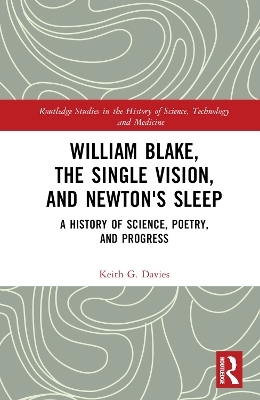
William Blake, the Single Vision, and Newton's Sleep
Routledge (Verlag)
978-1-032-45917-2 (ISBN)
The history and philosophy of scientific ideas and the role poiēsis and imagination play in our understanding of science and progress are widely explored in this book. By examining the views of William Blake and other poets in the context of twentieth-century philosophers Hannah Arendt, Jacob Bronowski, Martin Heidegger, Bruno Latour and Karl Popper, amongst others, the book takes an eclectic approach drawing on examples from biology, history, literature, philosophy and economics, arguing for the reestablishment of imagination as a central attribute of science that may help to resolve some of our most pressing ecological problems as seen in the context of science and technology studies and what is loosely developing into the discipline of environmental humanities.
Today, influential scientists looking at consciousness dismiss imagination regarding it at best as a mere epiphenomenon, a ghost in the machine, or at worst non-existent and to be denied. In this book, Keith G. Davies, who sees C. P. Snow’s debate on the separation of the arts and sciences as alive and well, traces the schism back to Plato but more importantly to the seventeenth century and David Hume’s removal of imagination in the conjunction between our observation of causes and their effects. Through extensive research and use of poetry, this book offers an alternate understanding of science with imagination and its continued significance in today’s world.
This book is an excellent reference book for postgraduate students, professional researchers, William Blake scholars and the pejoratively labelled interested laymen with concerns in ecology and environmental humanities through offering a new perspective on the history of science and the role of imagination within this field.
Keith G. Davies is an associate professor based at the University of Hertfordshire, where he teaches the science of crop protection and plant pathology. Dr Davies has published widely on crop protection in over 80 refereed articles and book chapters and has also been actively involved in public engagement with science. This is his first book that brings together his scientific concerns with his broader cultural and philosophic interests around the relationship between science, the humanities and the nature of progress.
1. Unacknowledged legislators 2. Providence and progress 3. Hegemony of science 4. Myopic evolutionists 5. Mind from matter 6. Matter from mind 7. City of imagination 8. Homo faber 9. Science and public affairs 10. Antidote for the future 11. Reawakening Newton 12. Where do we go from here? 13. Epilogue
| Erscheinungsdatum | 29.07.2023 |
|---|---|
| Reihe/Serie | Routledge Studies in the History of Science, Technology and Medicine |
| Zusatzinfo | 9 Halftones, black and white; 9 Illustrations, black and white |
| Verlagsort | London |
| Sprache | englisch |
| Maße | 152 x 229 mm |
| Gewicht | 453 g |
| Themenwelt | Geschichte ► Teilgebiete der Geschichte ► Kulturgeschichte |
| Naturwissenschaften | |
| ISBN-10 | 1-032-45917-4 / 1032459174 |
| ISBN-13 | 978-1-032-45917-2 / 9781032459172 |
| Zustand | Neuware |
| Informationen gemäß Produktsicherheitsverordnung (GPSR) | |
| Haben Sie eine Frage zum Produkt? |
aus dem Bereich


